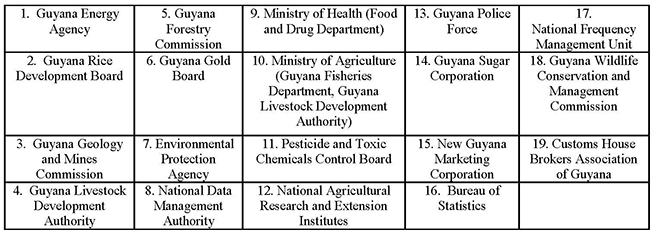Trade facilitation plays a vital role in economic growth and development and impacts in a measurable way on the ease of doing business in various countries. In Guyana, the Ministry of Business plays an important role in improving the overall business climate by identifying areas of weakness and spearheading comprehensive solutions. The Ministry of Business therefore understands that in order to improve Guyana’s economic performance, the Government of Guyana must invest in modern trade facilitation systems and promote their optimal use. One such system is the Electronic Single Window (ESW or Single Window) for trade which is defined as a facility that allows parties involved in trade and transport to lodge standardized information and documents with a single entry point to fulfil all import, export, and transit-related regulatory requirements.
As long as the information is electronic, then individual data elements need only be submitted once. This would reduce the time and cost of trade, aligning Guyana with international best practices and its commitments under the World Trade Organization’s (WTO’s) Trade Facilitation Agreement.
By enabling easy entry and exit of goods, it is expected that the Electronic Single Window will see more new investments, and more expansions of existing businesses, thus facilitating economic growth and increased revenues. It is also expected to drastically reduce the scope for corrupt practices, which are exacerbated by slow and inefficient systems.
Additionally, the Single Window can enhance the availability and handling of information; and expedite and simplify information flows between trade and government regulatory agencies. It can also result in a greater harmonisation and sharing of relevant data across governmental systems, bringing meaningful gains to all parties involved in cross-border trade.
Specifically, an Electronic Single Window solution caters to core functions that include, but are not limited to: Accessibility/Data submission; Security (Identification, Authentication, Access Control, Traceability and Encryption); Commodity Search; Electronic Payment; and Digital Signature.
The need for cooperation and collaboration amongst Agencies from the inception is critical to the process of implementing an ESW system. To this end, an Electronic Single Window Steering Committee led by the Ministry of Business and comprising officials from the Ministry of Finance, the Guyana Revenue Authority, the Shipping Association of Guyana and the Private Sector Commission, has been established. Stakeholder Agencies that are expected to participate in the fully implemented ESW are listed below:
With Guyana poised to become a significant oil producer by 2020, the importance of trade as a facilitator of economic growth cannot be understated. Therefore, investments in technology to improve currently existing systems are vital to the well-being and sustainability of our economy.
Further, Guyana as a member of the World Trade Organisation (WTO), is obligated to put systems in place to facilitate the ease of trade. As trade digitalization becomes of great import to Doing Business, World Bank Doing Business has included research questions on the availability and status of implementation of Electronic Data Interchange (EDI) and Single Window systems in its Trading across Borders questionnaire, and with this information, Doing Business has built a comprehensive dataset on the adoption and level of sophistication of electronic platforms in 190 economies.
With funding through the Korean Trust Fund, the Inter-American Development Bank (IDB) is supporting a Regional Technical Cooperation initiative to strengthen investment promotion and trade facilitation in the Co-operative Republic of Guyana and the Republic of Suriname, through targeted interventions with selected government agencies. Resources from the Technical Cooperation (TC) will be utilized to cover costs relating to some of the preparatory work required for the implementation of the Electronic Single Window.
The design of a project for the implementation of the ESW has commenced. The approach will be multi-phased and will require a full national effort if it is to be successfully concluded. The project will complement an ongoing National Quality Infrastructure Project designed to boost Guyana’s exports, as well as the impending Guyana-Brazil Road Transport Link and Deep Water Port.
The Ministry of Business has initiated several activities in preparation for the Electronic Single Window, the most recent being the hosting of a Workshop on “Developing a Road Map to Electronic Single Window in Guyana” in collaboration with the IDB. The objective of the Workshop was to identify and analyze conceptual models, hurdles for implementation and global best practices for an ESW in Guyana, based on which is the best route for ESW development that could be determined. Participants at the Workshop were drawn from regulatory agencies and the private sector. Following the Workshop, regulatory Agencies were requested to appoint technical teams with responsibility for ESW matters to allow for effective collaboration and coordination.
The Electronic Single Window Steering Committee is currently engaged in identifying activities to be included in the first phase of ESW implementation in Guyana, along with their sequencing, timing and costs. The Steering Committee has also begun identifying policy and institutional changes required for ESW to become operational, and is conducting a comprehensive review of Guyana’s legal and regulatory background in the area of Trade Facilitation and the implementation of a modern ESW. The latter exercise includes e-transactions, e-documents, e-signature and e-payments, among other areas that will form part of the single window system. The first components of the system are expected to be functioning by 2019.






